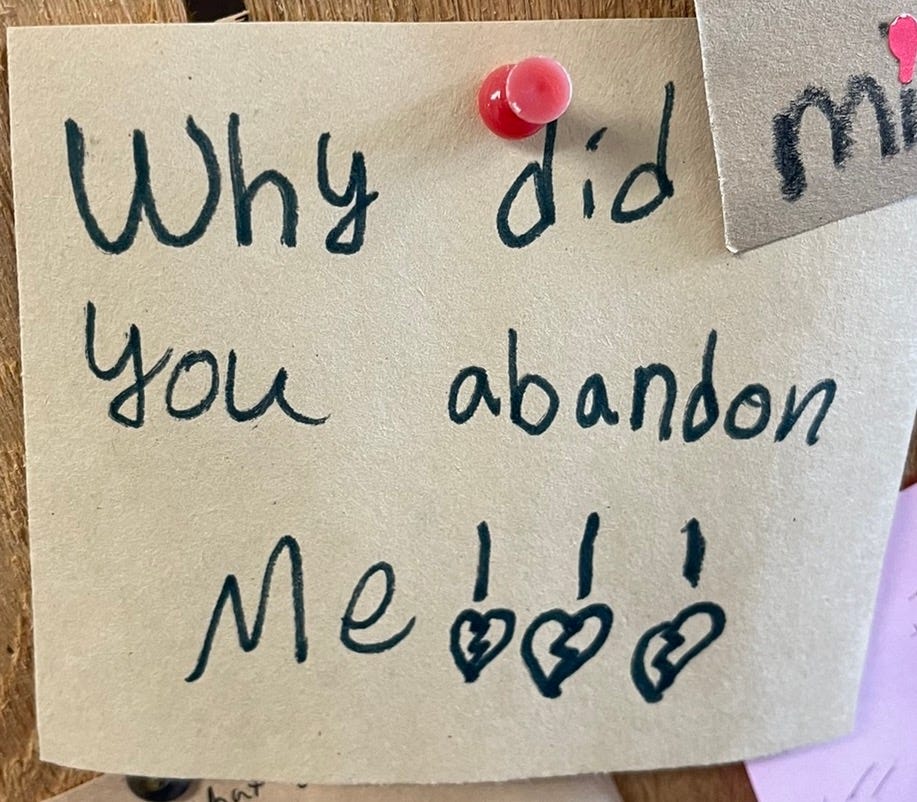How Loss & Grief Turned Into The Year Of The Opposite
An introduction to Ele's Place Healing Heart Breakfast & how it inspired me to share my story about the loss of a friend, my grief, and the catalyst for the year of the opposite.
"Why Did You Abandon Me!!!" This heart-wrenching message was written by a child struggling with the grief after the death of a loved one. It was displayed on the wall of Ele’s Place alongside other devastating notes:
"I am still loveable even though death has touched me"
"I hate you 4 dying,"
"Mom, out of everybody you chose me to die on,"
"love is watching someone die."

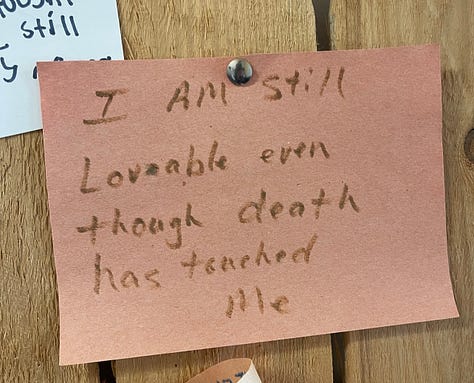
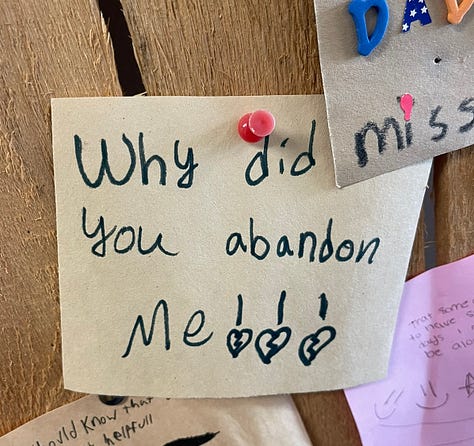
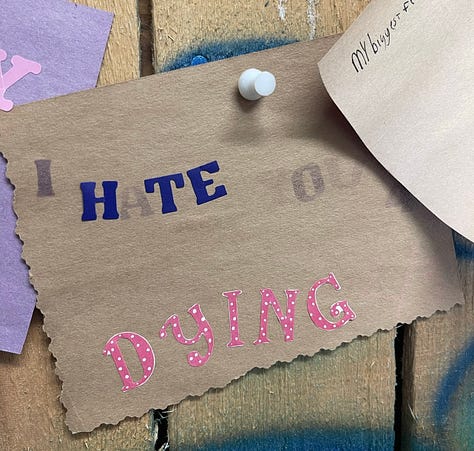

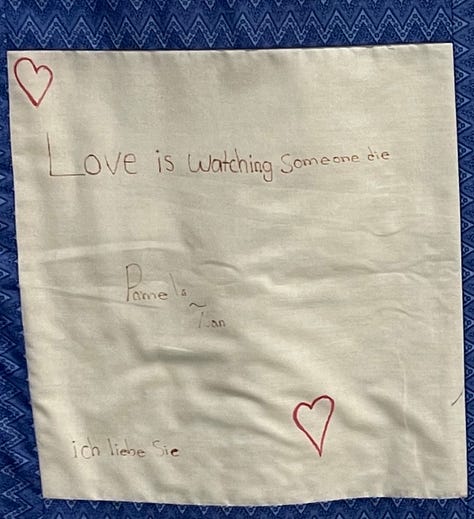
When I saw these notes, I knew that I had to join their Board. Ele's Place is a non-profit organization committed to ensuring that no child grieves alone. This outstanding organization serves an incredibly worthy cause and it operates with exceptional efficiency, directing the majority of its donations towards program implementation.
This week, we hosted the "Healing Hearts Breakfast," an event in which board members invite seven friends to learn more about Ele's Place, with the hope of encouraging them to support our mission. More than 350 people attended this weeks breakfast!
During the event, we listened to moving stories from three families who have benefited from the services provided by Ele's Place. It was an emotional rollercoaster.
It is alarming to learn that roughly 10% of children experience the loss of a parent before they turn 16. Ele's Place offers a safe, nurturing environment for these children to share their experiences with skilled counselors and peers who have experienced similar losses.
The breakfast was an incredibly poignant experience. Hearing the tragic and heart-wrenching stories of families who have lost loved ones deeply resonated with me. It's hard to comprehend the magnitude of loss and the accompanying grief that young children face during such challenging times.
When hearing the stories from these amazing kids I feel guilty. Somehow, I had been fortunate enough to go 41 years without experiencing the unexpected loss of a loved one. Although I have lost dear family members, such as my Grandpa Mike Brady, these losses were not sudden or unforeseen. Reflecting on the stories shared during the Healing Hearts Breakfast, I realized how incredibly fortunate I had been to have avoided such a loss, particularly given the sobering statistics.
I’ve been thinking a lot about grief this week because of that breakfast.
One of the things therapists recommend is to write about your feelings and thoughts as a way to get them out of your head. That is one of the reasons I started this newsletter. To write and share as a form of therapy for myself in the small hope that maybe it would help one person out there. I’ve been avoiding this topic but now seems like the time to address it given this weeks breakfast.
As I’ve said before, grief is what propelled me into a year of the opposite. In February of 2022 I lost a dear friend, Joe. A few months later, 2 more friends died. I was incapable of handling the grief and it sunk me into a depression.
I’m embarrassed to admit this but I didn’t really understand depression before experiencing it myself. When it hit me, it hit hard.
On February 21, 2022 I received a text from my good friend Mike saying:
“Really, really crap day boys. Just talked to Joe's sister. He's in really bad shape. Had a heart attack yesterday. In the ICU on a ventilator in Pontiac right now. Trying to figure out my schedule this week. They're only allowing one visitor from 5 - 8 pm. He was supposed to go back to rehab on Thursday.”
Within a few hours I had made the drive over to metro Detroit to be by Joe’s hospital bed. I had never seen anyone hooked up to so many medical devices. Machines were doing almost everything for his body. He was bloated and looked like he had significantly aged since I last saw him only a short 5 months before.
I don't think anyone will benefit from hearing the excruciating details of Joe's passing. As you would expect, it was devastating and profoundly sad. But I do want to mention the aspects that I believe are crucial to understanding my specific grief as it relates to Joes situation in hopes of potentially helping others.
The Visiting Hours
When Joe was in the hospital, it was nearly two years after the start of the Covid pandemic. Vaccines were widely available, and the novelty of the virus had largely worn off. “Novelty” meaning: most people had either been vaccinated or had previously contracted the illness by that time.
Yet, for some inexplicable and frustrating reason, the hospital still enforced a policy that allowed only one visitor to see Joe between 5 pm and 8 pm. Not one visitor at a time, but one visitor per day. His family members and friends had to choose who had the right to see him on any given day. Fortunately, I managed to slip past security and spend about ten minutes with him. If it weren't for my luck that one time, I wouldn't have been able to see him at all.
The hospital's rationale was that they were trying to protect patients and staff from Covid, and I don't blame them. I am confident that they were doing what they believed was in everyone's best interest. However, the policy had a profoundly damaging effect on me and, I believe, on his family.
For months, I couldn't shake the thought of Joe dying alone in his hospital bed with no one there to talk to him, advocate for him, or comfort him by holding his hand or covering him with a blanket.
This thought haunted me throughout my grieving process. I want to clarify that I do not fault the hospital and do not believe there was any malice or ill intent. However, I want to be honest about the personal impact of this policy because I believe these stories should inform future decisions.
With the benefit of hindsight, I think society should reflect on our choices and carefully evaluate whether the benefits genuinely outweighed the harms. Keeping friends and family away from dying loved ones should be done with extreme caution and care. I know firsthand that the damage inflicted can linger for a long time.
The Guilt
Two other aspects of Joe's passing haunted me. Firstly, I grappled with immense guilt. My friends and I had been aware of Joe's struggle with alcohol for years, and we had often considered organizing an intervention or, at the very least, having a serious conversation with him about our concerns and encouraging him to seek help. I felt guilty for never acting on that plan and couldn't help but wonder, "Could I have done more?"
To make matters worse, the last time I saw Joe was at an MSU Spartan Tailgate party, where we were all heavily consuming alcohol. Joe's unexpected arrival, drinking a hard seltzer, caught me off guard as he had been sober the last time we spoke. I didn't confront him about his drinking, believing it would be hypocritical to judge my friend while I was also indulging in excessive alcohol consumption.
These three factors - the hospital visiting hours, the guilt of not intervening, and not addressing Joe's drinking the last time I saw him - were the primary thoughts that tormented me about his loss.
It wasn't until after his funeral that I knew something needed to change.
Joe's funeral took place in a beautiful Catholic church in the metro Detroit area, with a large gathering of friends and family. Afterward, our group of friends went to a local restaurant and bar, where many of us had alcoholic drinks. My friend Ryan had joined us and he asked if he could drive my new car on the hour-long trip home. This was music to my ears because it meant that I didn't have to worry about driving. I now had a designated driver.
Consequently, I had three beers. I wasn't intoxicated, but I wouldn't have indulged if I were driving home. Reflecting on my actions later that night, I thought, "My close friend died from excessive drinking, and I drank at his funeral."
I felt foolish, like a fraud. I had been beating myself up over not organizing an intervention for Joe, yet I couldn't even honor him by abstaining from alcohol at his funeral. I felt like a hypocrite.
My relationship with alcohol has always been complicated.
When I was 12, my parents jokingly said, "If you don't drink until you're 21, we'll give you $1,000." Not a single person thought they were serious, except for me. I remembered that comment and frequently brought it up.
I embraced the challenge, and later, when my cousin Ryan, whom I idolized, decided not to drink, I followed suit. And, as a punk rock fan who enjoyed the band Minor Threat and the Straight Edge movement they helped create, I resolved not to drink alcohol until I was 21.
Not only did I abstain from drinking, but I took it a step further and made it a part of my identity. I occasionally wore big black X's on my hands, named my band X-Rated, and belonged to a close-knit group of friends who had mostly chosen not to drink.
It wasn't just that I didn't drink; I was vocal about it. In hindsight, I'm ashamed of some of my behavior. I was too judgmental about something I didn't understand and had never tried. From the age of 12 to 17, I was vocally opposed to alcohol consumption. But that started to change…
During my senior year of high school, while playing hockey, I suffered a terrible accident when another player's skate inflicted a six-inch-long wound on my throat.
I was rushed to emergency surgery, and during the procedure, the doctor told me I had been a mere quarter-inch away from death.
At just 17 years old, I had narrowly escaped death, and it led me to contemplate all the aspects of life I had yet to experience. One recurring thought was about alcohol and drugs. By this time, many of my friends had tried them without any severe consequences, and I wondered if I was too judgmental about something I had never experienced myself.
However, abstaining from alcohol had become my identity. It wasn’t easy to just change after committing to this policy so religiously and after I had proselytized it so strongly. Moreover, I had the prospect of winning $1,000 if I waited until I turned 21. So I waited.
At 12:01 am on my 21st birthday, I drank a bottle of Crystal Champagne, a choice inspired by my favorite artist. It wasn't the best first choice.
I didn't get drunk or even buzzed that first night, but I knew I wanted to try again. This set me on a new path. After getting drunk for the first time, I discovered that alcohol helped me overcome my natural shyness, making it easier to socialize and connect with a new group of friends who enjoyed partying and the bar/nightclub scene.
The realization that I enjoyed drinking alcohol and I could do so safely prompted me to reevaluate my other beliefs.
It’s hard for me to describe just how earth shattering this realization was for me. It was a bit like realizing that Santa didn’t exist. Or, maybe more similar, like believing in a religion for your entire life but then having a crisis of faith that makes you question everything that you had previously believed. It felt like everything I believed was wrong.
If my perception of alcohol had been so wrong, what other misconceptions might I hold?
This inquisitiveness led me down a potentially perilous path. Over the ensuing years, I experimented with a variety of drugs. In almost all cases, I just tried them once or twice to see how I reacted to them and to experience each of them for myself first hand.
I share this not out of pride but with a sense of self-admonishment. My actions were risky and dangerous. It could have ended badly. I feel like I was spiraling a bit. For the previous 21 years, I had a clear picture of “right and wrong” albeit lacking any first hand experience. Now I didn’t know what was “right” and what was “wrong”. The picture was much less clear. This experience ignited a profound curiosity to reassess other firmly-held beliefs that lacked a basis in my own firsthand experience. The situation could have taken a disastrous turn, but fortunately, it did not.
Luckily, I had pleasurable experiences trying all of the various drugs, but I didn’t continue using them. Except for one. Marijuana became a significant part of my life from age 21 to my mid-thirties. My identity shifted 180 degrees almost overnight. I went from "I don't drink or use drugs" to "I'm a pothead."
But surprisingly, contrary to stereotypes and cliches, marijuana motivated and invigorated me. I'm not sure if this was because I waited until I was 21 to try it, but it gave me direction and ambition. Kinda the opposite of the results that many people experience.
During this time, my career flourished. My salary increased, my performance improved, my job titles became more prestigious, and I earned equity in a company. I’m not sure if it’s correlation or causation. But it seemed that Marijuana work for me… until it didn't.
Around my 37th birthday, after smoking four or five joints in one night and still not feeling high enough, I had a moment of clarity. The routine of smoking weed had gotten consuming. As with most things, after using for so long I had to consume more and more to get the same effects.
It just wasn’t fun anymore. It wasn’t helping like it used to. So, because I’m a huge nerd, I wrote myself a note that read: "The weed isn't helping you anymore. It's just become an expensive and ugly habit. The definition of insanity is doing the same thing over and over and expecting different results."
The next day I woke up and read the note. After smoking everyday for almost 15 years, I finished reading the note and decide I was quitting. And I did so that day.
It was a little challenging at first, mostly due to the habitual nature of it. I missed the process of preparing to smoke, and for some reason, it affected my appetite. But these minor effects only lasted a few days. It was surprisingly easy for me to stop.
So, for 21 years, I had refrained from using drugs or alcohol. Then, I radically switched and experimented with various substances for the next 15 years or so.
Fast forward to March of 2022: I'm grappling with Joe's death from alcohol and the fact that I drank at his funeral. As I mentioned before, my history with alcohol is complicated.
Unable to shake the guilt and sadness over Joe's death, I decided to make a change in his honor. Inspired by the Seinfeld episode "The Opposite" and the commencement speech "Just Make Your Bed," I started waking up early, making my bed, and flossing my teeth.
It was time to make another change. On March 15th, 2022, I stopped drinking. Much like with weed, I just stopped. I recognize that it's not easy for everyone, but I had the advantage of making this decision voluntarily rather than due to a problem or addiction. Also, Joe was a motivator for me. He gave me a bigger reason to stop.
Initially, I didn't plan to quit drinking for a year. I thought, "I'll stop for a while." But as time went on, a little while turned into a week, then a month, and eventually, I decided to make it a year. Now, 13 months into my alcohol-free journey, I have never felt better.
Of course, it’s not all due to me stopping drinking alcohol. I’ve made a lot of other positive changes since I quit. But by stopping drinking and weed, I unlocked a tremendous amount of time and resources that could now be redirected towards other uses. I no longer had to waste mornings to hangovers. No more wasting money buying rounds of shots for the entire bar of strangers. And my socializing could be redirected from shallow conversations at a noisy bar to a breakfast with a mentor that I hadn’t reconnected with in years. It’s not so much that the alcohol was holding me back. I just wasted so much time and money when I was drinking.
Something that became clear to me was that it wasn’t alcohol that was bad. In many ways, it was awesome. But I kept wondering. What was alcohol and weed helpful for? I think I discovered an answer for me.
Alcohol and weed make boring things enjoyable. I used to think that was amazing. You could make a boring dinner super enjoyable with alcohol! You could make sitting around a table for 3 hours talking about nothing seem incredibly fun (even if we didn’t remember it the next day). I used to think this was an amazing aspect of alcohol.
But now I realize, it was limiting me. Why was I content with doing boring things so much? Why not raise my expectations? Instead of just sitting around talking about nothing. Why not play pickle ball? Go for a run? Learn to shoot a bow and arrow? Or go to church and talk to an amazing pastor like Marvin or Jack?
Alcohol can make boring things super fun. And that’s awesome. But now I shoot my sights a little higher. I want to make fewer of my moments boring.
Let me be clear. I had a BLAST for the past 21 years while I was drinking. I don’t regret them at all. Luckily, I don’t regret drinking or using any drugs. They were all experiences that I needed to go through and they taught me a lot. I made a lot of great connections. And I still love being around my friends when they are drinking. I don’t look down on alcohol at all. But I think I’m in a new period of my life right now.
It’s possible that I may drink alcohol again in the future. I haven’t ruled it out. But for right now I’m thinking that I run my life in seasons. 21 years at a time.
Rest in peace Joe.



